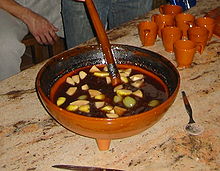This article needs additional citations for verification. (August 2009) |
Queimada is an alcoholic beverage of Galician tradition.



Queimada is a punch made from Galician aguardente (orujo from Galicia)--a spirit distilled from the byproducts of winemaking—and made with sugar, lemon or orange peel, and coffee beans.[1] Variations of queimada may include cinnamon or apples.[2] It is traditionally prepared in a hollowed-out pumpkin or a ceramic or clay pot.[3]
Typically, while preparing the punch a spell or incantation is recited, so that special powers are conferred to the queimada and those drinking it. Then the queimada is set alight, and slowly burns as more brandy is added.
Origins
editQueimada has origins in the Celtic pagan festivals of Galicia.[3][4] Other aspects of Spain's history that influence the drink include the Arabs and Moors, and the Spanish colonies in South America.[3][5][6]
Tradition
editThe goal of the preparation ritual is to distance the bad spirits that, according with the tradition, lie in wait for men and women to try to curse them.[citation needed] All occasions are good for a queimada: a party, familiar meetings or gatherings of friends. After dinner, in the darkness of night, is one of the best times for it. The tradition[which?][where?] also says that one of the perfect days to make the conxuro da queimada ('spell of queimada') is in Samhain, the Celtic New Year's Eve[citation needed]. However, typically the queimada ritual takes place during St. John's Night or 'witches' night' on the 23rd of June.
The people who take part in it gather around the container where it is prepared, ideally without lights, to cheer up the hearts and to be better friends. One of them ends the process of making the queimada while reciting the spell holding up the burning liquid in a ladle and pouring it slowly back into the container.
| In Galician language | In English |
|---|---|
Mouchos, curuxas, sapos e bruxas. Demos, trasgos e diaños, espíritos das neboadas veigas. Corvos, píntegas e meigas: feitizos das menciñeiras. Podres cañotas furadas, fogar dos vermes e alimañas. Lume das Santas Compañas, mal de ollo, negros meigallos, cheiro dos mortos, tronos e raios. Ouveo do can, pregón da morte; fuciño do sátiro e pé do coello. Pecadora lingua da mala muller casada cun home vello. Averno de Satán e Belcebú, lume dos cadáveres ardentes, corpos mutilados dos indecentes, peidos dos infernais cus, muxido da mar embravecida. Barriga inútil da muller solteira, falar dos gatos que andan á xaneira, guedella porca da cabra mal parida. Con este fol levantarei as chamas deste lume que asemella ao do Inferno, e fuxirán as bruxas a cabalo das súas vasoiras, índose bañar na praia das areas gordas. ¡Oíde, oíde! os ruxidos que dan as que non poden deixar de queimarse no augardente quedando así purificadas. E cando este beberaxe baixe polas nosas gorxas, quedaremos libres dos males da nosa alma e de todo embruxamento. Forzas do ar, terra, mar e lume, a vós fago esta chamada: se é verdade que tendes máis poder que a humana xente, eiquí e agora, facede que os espíritos dos amigos que están fóra, participen con nós desta Queimada. |
Owls, barn owls, toads and witches. Demons, goblins and devils, spirits of the misty vales. Crows, salamanders and witches, charms of the folk healer(ess). Rotten pierced canes, home of worms and vermin. Wisps of the Holy Company, evil eye, black witchcraft, scent of the dead, thunder and lightning. Howl of the dog, omen of death, maws of the satyr and foot of the rabbit. Sinful tongue of the bad woman married to an old man. Satan and Beelzebub's Inferno, fire of the burning corpses, mutilated bodies of the indecent ones, farts of the asses of doom, bellow of the enraged sea. Useless belly of the unmarried woman, speech of the cats in heat, dirty turf of the wicked born goat. With this bellows I will pump the flames of this fire which looks like that from Hell, and witches will flee, straddling their brooms, going to bathe in the beach of the thick sands. Hear! Hear the roars of those that cannot stop burning in the firewater, becoming so purified. And when this beverage goes down our throats, we will get free of the evil of our soul and of any charm. Forces of air, earth, sea and fire, to you I make this call: if it's true that you have more power than people, here and now, make the spirits of the friends who are outside, take part with us in this Queimada. |
References
edit- ^ Knelly, Clarice (2023-06-24). "Queimada, The Traditional Galician Drink That's Set On Fire". Tasting Table. Archived from the original on 2024-03-30. Retrieved 2024-03-30.
- ^ Casas, Penelope (2014). 1,000 Spanish Recipes. Houghton Mifflin Harcourt. p. 670. ISBN 9780470164990.
- ^ a b c Griffiths, Chris. "Galicia's mythic drink of blue fire". www.bbc.com. Archived from the original on 2023-03-20. Retrieved 2023-03-21.
- ^ a b Jennifer (2021-10-17). "Queimada, typical Galician drink". Let's Teach Europe. Archived from the original on 2024-03-30. Retrieved 2024-03-30.
- ^ "Set This Punch Aflame to Ward Off Evil Spirits". Atlas Obscura. Archived from the original on 2024-03-30. Retrieved 2024-03-30.
- ^ Wong, Cecily; Thuras, Dylan; Rummel, Rachel; Ewbank, Anne; O'Brien, Sam (2021). Gastro obscura: a food adventurer's guide. An Atlas Obscura book (First ed.). New York: Workman Publishing. p. 43. ISBN 978-1-5235-0219-6.